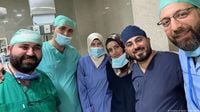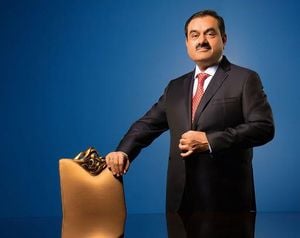In a remarkable turn of events, a recent medical mission from Germany has potentially saved the life of Mohammed Qanbat, a 55-year-old resident of Hama, Syria. After enduring the ravages of a deteriorating healthcare system due to Syria's 14-year civil war, Qanbat underwent open-heart surgery in April 2025, a procedure that has become increasingly rare in his homeland.
Qanbat's surgery was part of a larger initiative by the Syrian German Medical Association (SGMA), which was founded in January 2025 after the ousting of Syrian dictator Bashar al-Assad in December 2024. The SGMA emerged from a WhatsApp group of Syrian doctors in Germany who sought to provide medical assistance back home. Today, it boasts around 500 members.
"I can't express how happy and grateful I am," Qanbat told DW. "It's beyond words. We have waited so long for our children to come and help us. But they have not forgotten us. They returned to help us." His sentiments reflect the hope shared by many Syrians who have faced the challenges of a collapsing healthcare system.
According to the World Bank, the number of physicians serving the Syrian population plummeted from approximately 30,000 in 2010 to less than 16,000 by 2020. Many medical professionals, including doctors, nurses, and pharmacists, fled the country, with a significant number relocating to Germany. Current estimates suggest that over 6,000 Syrian doctors are practicing in Germany, but the actual number may exceed 10,000 when considering those who have acquired German citizenship.
The SGMA's recent mission involved around 85 doctors traveling to Syria to provide educational lectures, assess the healthcare system, and perform surgeries. One of the most pressing challenges faced by these medical professionals is the outdated equipment in Syrian hospitals. Ayman Sodah, a senior physician and cardiologist, noted, "It's clear that during [the past] 15 years, nothing has been renewed." He emphasized that before the war, Syria had a relatively robust healthcare system.
Despite the challenges, the mood among the SGMA members was hopeful during their mission. In Damascus, around 300 people gathered to hear from the delegation, including medical students and local authorities. Mustafa Fahham, a senior doctor in nephrology and dialysis, expressed his excitement, saying, "Every Syrian had, at the back of their minds, a fear that was connected with Assad. Now that fear is gone. So I'm feeling good, and I am happy to be here in Damascus, where I'm able to finally help support the Syrian health system."
The mission was strategically timed to coincide with the Easter and Ramadan holidays, allowing many doctors to visit their families in Syria after years of separation. Nour Hazzouri, a senior physician and co-founder of SGMA, explained how the idea of providing medical assistance emerged during this time. However, he acknowledged that security remains a concern in certain regions of Syria, limiting the areas where doctors could work.
Funding for the mission largely came from the Syrian volunteers themselves, who contributed to travel costs and raised funds for medical supplies. Hazzouri shared that they managed to raise almost €100,000 through an online fundraising campaign, primarily from Syrian doctors in Germany. Local NGOs also played a vital role by donating materials and support.
While the SGMA has not yet received official backing from the German government, members attended a mid-February 2025 conference organized by the German Ministry of Development focused on German-Syrian hospital alliances. This event was seen as a positive step towards potential collaboration.
In addition to the SGMA's efforts, another campaign called "Shifa, Hand in Hand for Syria" has also launched, involving around 100 Syrian doctors and directly linked to the Syrian Ministry of Health.
As the SGMA's medical volunteers prepare to return to their positions in Germany, a recent survey by the Syrian Association for Doctors and Pharmacists in Germany revealed that 76% of their members are contemplating a permanent return to Syria. This reflects growing concerns among Syrian medical professionals regarding the rise of far-right and anti-immigration sentiments in Germany, which have made integration challenging for many.
Despite only comprising about 2% of all doctors in Germany, Syrian physicians have become crucial in addressing staff shortages in hospitals, particularly in eastern regions. Fahham remarked on the dual loyalty many Syrian doctors feel, saying, "We do consider Germany, and of course, not all the doctors would leave at once. On the other hand, we also feel loyalty to Syria. But I believe we can come up with some sort of plan where we can help here, and German healthcare is also covered."
Moreover, SGMA's lectures in Syria were not solely focused on medical updates; they also aimed to guide medical students and professionals interested in working in Germany. Muaz al-Moarawi, a doctor based in Gelsenkirchen, highlighted the need for collaboration, stating, "Syria needs a lot of help right now to rebuild its healthcare. But Germany also needs Syrian doctors and medical personnel. What we want is to be a bridge between Syria and Germany, a bridge both sides can profit from."
Meanwhile, in a related development, families like that of Ibrahim, a father of six, are beginning to return to their homes after years of displacement. After spending seven years in a tent at a refugee camp in the Aleppo region, Ibrahim's family returned to their village, Maasaran, in April 2025, despite their house being partially destroyed. This return is part of a broader trend, as hundreds of thousands of Syrians are attempting to come back home, a priority for the new Syrian government following the long civil war.
The stories of both medical missions and returning families underscore the resilience and hope of the Syrian people as they navigate the complexities of rebuilding their lives and their country's healthcare system.




